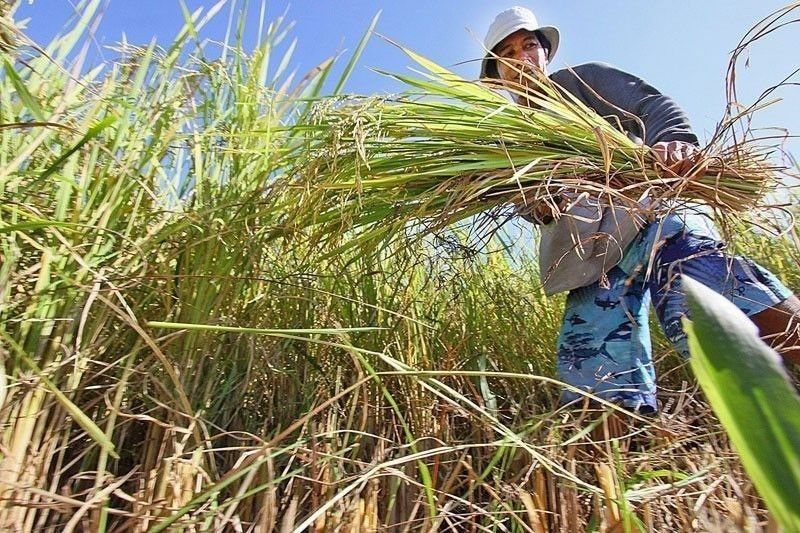Congress cuts palay-buying fund by P3 billion

MANILA, Philippines — There will be less money to buy the rice farmers’ palay produce next year.
The P3-billion reduction in the palay procurement fund of the National Food Authority (NFA), which the Senate initiated, was retained in the final version of the proposed P4.1-trillion 2020 national budget.
The 37 members of the Senate-House of Representatives budget conference committee signed their report containing the final version on Wednesday. Later that day, the two chambers ratified the report.
President Duterte had proposed P7 billion for the NFA palay procurement fund, which the House increased by P3 billion to P10 billion.
Using the P3 billion alone, the NFA could buy 150 million kilos, or three million 50-kilo bags, of dry palay at P20 per kilo. The NFA offers a much lower price for wet palay. The P10 billion is good for 500 million kilos.
The House had hoped that with NFA buying more of the rice farmers’ produce, prices, which have fallen to below production cost, would go up.
In their version of the budget, senators slashed the palay procurement fund back to P7 billion, giving the P3-billion House augmentation to the Land Bank for lending to local government units, also for palay buying, at an interest rate of two percent per year.
Land Bank stood to earn P60 million a year in interest income on funds belonging to taxpayers.
In the conference committee version, the P3 billion was allocated to the Department of Agriculture for distribution to farmers as cash aid, again through Land Bank.
It is not clear if the state-owned bank would charge an administrative cost, which it does in the case of tens of billions in cash transfers to poor households under the Pantawid Pamilyang Pilipino Program.
According to Sen. Sonny Angara, who chairs the Senate finance committee, it was Sen. Cynthia Villar, head of the agriculture committee, who authored the P3-billion palay-buying fund reduction.
In the wake of Sen. Panfilo Lacson’s claim that the approved 2020 budget is laden with pork barrel funds, Davao City Rep. Isidro Ungab, who is House appropriations committee chairman, insisted that there is no pork in the spending bill.
“In compliance with the express instructions of the President, the 2020 General Appropriations Bill (GAB) contains no pork, no last-minute insertions and no parked funds. The budget process was undertaken with utmost transparency,” he said.
Ungab said allegations that the outlay includes pork “is unfair and misleading.”
“The Supreme Court has already declared pork barrel funds as unconstitutional and clearly defined what constitutes pork. The 2020 budget is pork-free,” he said.
He added that all changes made in the proposed spending program “were aligned with the President’s priorities and were based on the recommendations of the Cabinet departments and other government agencies.”
“Both houses ratified the budget bill. The representatives of both the Senate and the House agreed on the amendments to, and final version of, the 2020 GAB in the conference committee,” Ungab stressed.
Despite the ratification of the budget program by the conference committee, some agencies are still batting for changes in their respective allocations.
The Public Attorney’s Office (PAO) has sent President Duterte a letter requesting the latter to veto a special provision in the GAB that limits and prevents the use by PAO of maintenance and other operating expenses (MOOE) funds for its Forensic Laboratory Division.
Aside from the deletion of the P19.5 million allocated for the purchase of equipment of the PAO-Forensic Laboratory Division, PAO head Persida Acosta said “it has come to our attention that a provision in the General Appropriations Bill was inserted to the effect that no funds may be used for the meetings and other maintenance and operating expenses of the PAO Forensic Laboratory.”
The changes “have only one objective – to paralyze the PAO Forensic Laboratory and jeopardize its operations, depriving them of the opportunity to assist the clients of the PAO,” Acosta said.
The Commission on Population (PopCom), meanwhile, said Senate President Vicente Sotto III’s removal of some P195 million from the Department of Health (DOH)’s budget for the procurement of birth control implants would have dire consequences.
“The action of the Senate president is regrettable, since there is no scientific basis for the removal of progestin subdermal implants (PSI),” PopCom executive director Juan Antonio Perez III said in a statement. “Likewise, there is no new evidence that PSIs are abortifacients.”
PopCom records showed that in 2018, the the government’s population control program required about 150,000 to 200,000 implants every six months.
Currently, the DOH has about 190,000 implants in stock and this will run out by the middle of 2020.
Perez said the reasons given by Sotto in cancelling the budget are based on the same arguments already rejected by the Food and Drug Administration in November 2017. – Rhodina Villanueva, Sheila Crisostomo
- Latest
- Trending





























